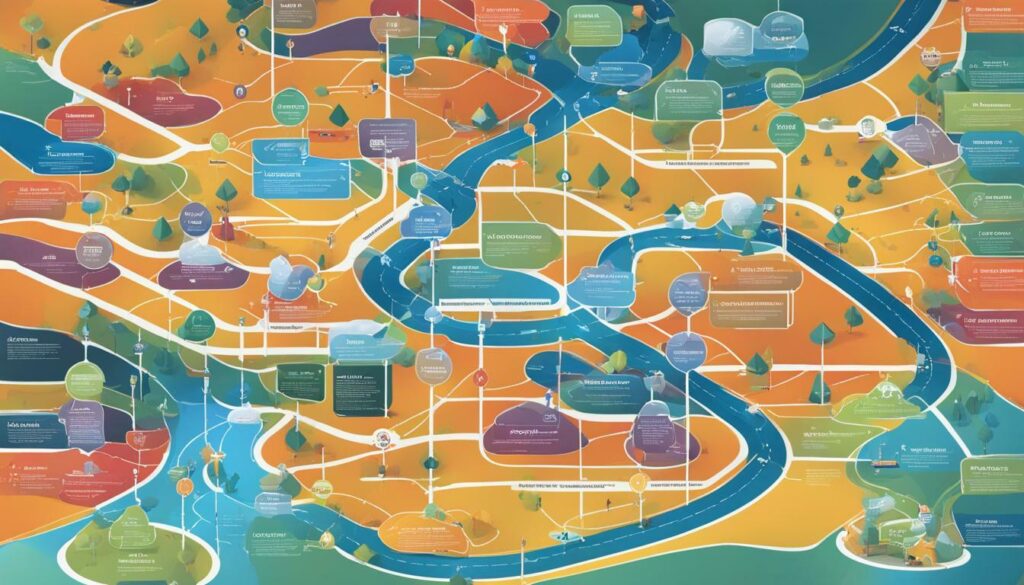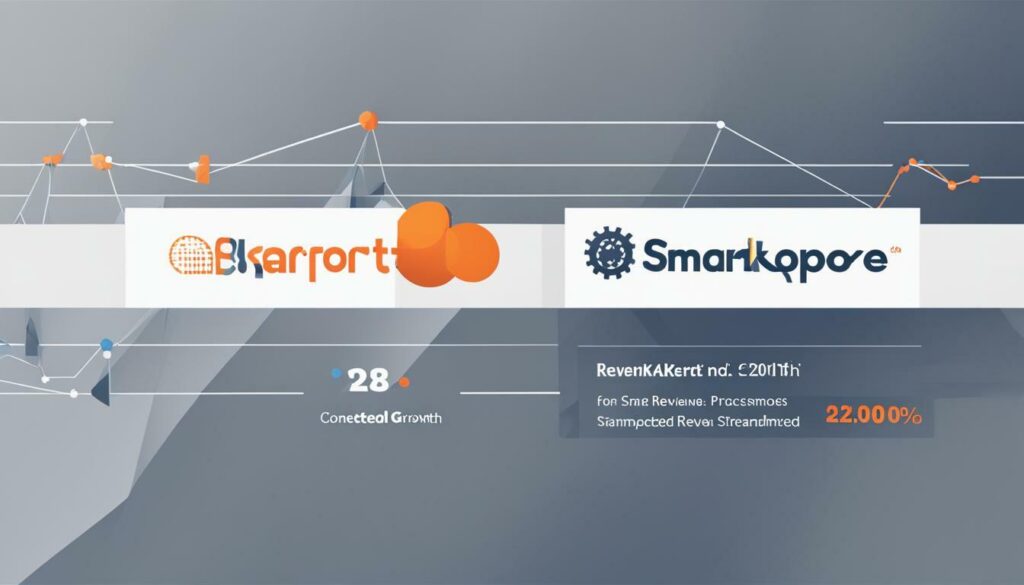When it comes to B2B SaaS companies, there is a growing interest in exploring whether channel partners can effectively serve as service partners. Partnering with channel partners can offer numerous benefits, including increased brand reach, improved sales narrative, and leveraging the social ladder of well-known brands. To understand this concept better, let’s delve into the world of B2B SaaS partnerships and discover how companies like HubSpot and SmartKarrot have successfully utilized partnerships to enhance their businesses.
- B2B SaaS companies can benefit from partnering with channel partners to increase brand reach and improve sales narrative.
- There are different types of partner programs, including referral programs, affiliate programs, and integration partnerships.
- Building a B2B SaaS partner program can lead to amplified growth, better brand association, increased revenue, and an extended network.
- It is important to align sales and marketing processes, establish clear objectives, and maintain effective communication to support the partnership.
- Selecting the right incentives and partners is crucial for the success of a B2B partner program.
Understanding B2B SaaS Partnerships
Before diving into the potential role of channel partners as service partners, it’s important to understand the landscape of B2B SaaS partnerships. B2B SaaS companies can greatly benefit from partnering with other businesses to expand their reach, enhance their sales narrative, and tap into the social ladder of well-known brands. Partner programs play a pivotal role in fostering these collaborations, enabling companies to leverage each other’s strengths and resources for mutual growth.
There are various types of partner programs that B2B SaaS companies can explore. Referral programs, for instance, involve users referring others to the service in exchange for a commission. This helps drive new customers and revenue streams. Affiliate programs, on the other hand, allow active users to promote the service by sharing affiliate links. These programs provide incentives for users to advocate for the product, resulting in increased visibility and sales.
Integration partnerships are another type of B2B SaaS partnership that facilitates a seamless user experience. By integrating their services, two companies can offer customers a unified and user-friendly solution. This not only enhances the value proposition but also opens up new market opportunities.

Building a B2B SaaS partner program can lead to amplified growth and various other benefits. These include:
- Mutual values and goals: Partnerships allow companies to align their visions and work towards common objectives.
- Better brand association: Partnering with established brands helps enhance the reputation and credibility of B2B SaaS companies.
- Increased revenue: Collaborating with channel partners can expand the customer base and drive more sales.
- Extended network: Partnering with other businesses enables access to their networks, opening new doors to potential customers and opportunities.
- Enhanced product portfolio: Through partnerships, companies can offer a more comprehensive product suite, adding value for their customers.
- Indirect sales channels: Partner programs create avenues for indirect sales, where partners actively promote and sell the B2B SaaS offering.
Two notable success stories in the B2B SaaS space are HubSpot and SmartKarrot. These companies have effectively leveraged partnerships to enhance their businesses. By establishing strong collaboration networks and strategic alliances, they have been able to reach wider audiences, strengthen their market position, and drive exponential growth.
However, building and managing a successful B2B partnership program requires careful planning and execution. It is crucial to align sales and marketing processes, establish clear objectives, create program rules for partners, and maintain effective communication. Complications may arise, but partnering with the right companies can help overcome challenges and reap numerous benefits, including increased revenue, brand presence, improved networking, information exchange, and technological advancements.
Selecting the right incentives and partners is key to the success of a B2B partner program. By carefully considering mutual goals, target audiences, and value propositions, B2B SaaS companies can forge strategic partnerships that drive growth and deliver value to their customers.
The Benefits of Partnering with Channel Partners
Partnering with channel partners can provide a range of benefits for B2B SaaS companies. By collaborating with established channel partners, SaaS companies can tap into their extensive networks and reach a wider audience. This increased brand reach can lead to greater exposure and awareness, ultimately driving more leads and sales for the SaaS company.
Not only do channel partners offer an expanded customer base, but they also bring with them their own expertise and industry knowledge. This can be particularly valuable for B2B SaaS companies, as channel partners can help improve the sales narrative by effectively communicating the unique value proposition of the SaaS product or service. By leveraging the social ladder of well-known brands, SaaS companies can gain credibility and trust in the market.
There are different types of partner programs available for B2B SaaS companies to choose from. Referral programs, for example, involve users referring others to the SaaS service in exchange for a commission. Affiliate programs, on the other hand, involve active users promoting the SaaS service through affiliate links. Integration partnerships allow two services to work together to create a seamless and user-friendly experience for customers.
Building a B2B SaaS partner program can lead to amplified growth and mutual values. It can also result in better brand association and increased revenue for both the SaaS company and the channel partner. Additionally, partnering with channel partners can help extend the SaaS company’s network, enhance its product portfolio, and provide access to indirect sales channels. Successful examples of B2B SaaS companies that have leveraged partnerships include HubSpot and SmartKarrot, who have effectively utilized partner programs to improve their businesses.

- Increased brand presence and visibility in the market
- Improved networking opportunities with other industry players
- Exchange of valuable information and insights
- Technological advancements through collaboration and innovation
While B2B partnership programs can sometimes be complicated to manage, partnering with the right companies can help overcome challenges and lead to an increase in revenue. It is crucial for SaaS companies to carefully select the right incentives and partners that align with their business objectives and target audience. By establishing clear objectives, creating program rules for partners, and maintaining effective communication, B2B SaaS companies can maximize the benefits of partnering with channel partners and drive their businesses to new heights.
Types of Partner Programs in B2B SaaS
B2B SaaS companies have a variety of partner program options to choose from, each serving a distinct purpose. These partner programs enable companies to expand their reach, tap into new markets, and drive revenue growth through strategic collaborations. Here are some types of partner programs commonly found in the B2B SaaS industry:
- Referral Programs: Referral programs involve existing users referring others to the B2B SaaS service in exchange for a commission or reward. This program leverages the power of word-of-mouth marketing and harnesses the trust and credibility of satisfied customers to attract new users.
- Affiliate Programs: Affiliate programs incentivize active users to promote the B2B SaaS service by sharing affiliate links. These links allow affiliates to earn a commission for every new sign-up or sale that is generated through their referral. This program taps into the marketing prowess of influencers, bloggers, and content creators to expand the customer base.
- Integration Partnerships: Integration partnerships involve the collaboration between two complementary software services to provide users with a more seamless and integrated experience. By integrating their software with other industry-leading solutions, B2B SaaS companies can enhance their value proposition, improve user satisfaction, and attract new customers.
Each of these partner programs offers unique benefits and can be tailored to suit the specific goals and requirements of B2B SaaS companies. By implementing the right partner program, companies can leverage the collective influence, expertise, and customer base of their partners to drive mutual success.
Partner programs at work: HubSpot and SmartKarrot
Two examples of B2B SaaS companies that have effectively utilized partner programs are HubSpot and SmartKarrot. HubSpot’s partner program offers different levels of engagement, including reselling partnerships, agency partnerships, and app marketplace partnerships. This comprehensive program allows partners to earn recurring revenue, access training and support, and tap into a global network of HubSpot users.
SmartKarrot, on the other hand, has a strategic partnership program that enables other SaaS companies to integrate their customer success platform into their existing offerings. This integration partnership expands SmartKarrot’s reach and allows them to provide a comprehensive customer success solution to a wider audience.

Partner programs in the B2B SaaS industry offer a multitude of benefits for companies willing to embrace collaboration and leverage the strengths of their partners. By selecting the right partner program and fostering strong partnerships, B2B SaaS companies can accelerate their growth, establish themselves as industry leaders, and unlock new revenue streams.
Success Stories: HubSpot and SmartKarrot
To see the potential impact of partnering with channel partners, let’s take a closer look at the success stories of HubSpot and SmartKarrot. These B2B SaaS companies have harnessed the power of partnerships to enhance their businesses and drive growth.

HubSpot, a leading provider of inbound marketing and sales software, has built a robust partner program that has contributed significantly to its success. By partnering with channel partners, HubSpot has been able to extend its brand reach and tap into new markets. Through their strategic alliances, HubSpot has been able to leverage the social ladder of well-known brands, gaining credibility and trust among potential customers.
Partnering with channel partners allows B2B SaaS companies like HubSpot to amplify their growth, improve their sales narrative, and establish themselves as trusted industry leaders.
SmartKarrot, a customer success platform, is another prime example of how partnerships can be instrumental in driving success. By collaborating with channel partners, SmartKarrot has not only expanded its customer base but also enhanced its product portfolio. Integration partnerships, in particular, have allowed SmartKarrot to offer a more comprehensive solution to its customers, creating a seamless and user-friendly experience.
Overall, these success stories highlight the immense value that can be derived from partnering with channel partners as B2B SaaS companies. The benefits include increased brand presence, improved sales narrative, extended network, enhanced product portfolio, and access to indirect sales channels. However, it is important for companies to carefully select their partners and align their sales and marketing processes in order to maximize the potential of these partnerships.
Key Factors for Successful B2B Partner Programs
Building a successful B2B partner program requires careful consideration of several key factors. By aligning sales and marketing processes, establishing clear objectives, and maintaining effective communication, companies can create partnerships that drive growth and foster mutually beneficial relationships.
- Aligning sales and marketing processes: The key to a successful B2B partner program lies in the seamless collaboration between sales and marketing teams. By aligning their strategies, companies can create a cohesive narrative that resonates with both existing and potential customers. This synchronized approach ensures that partners receive the necessary support and resources to effectively promote the product or service.
- Establishing clear objectives: Defining clear objectives is essential for building a strong B2B partner program. Companies should establish measurable goals, such as increasing brand reach, generating new leads, or expanding into new markets. This clarity helps partners understand their role and enables effective tracking of program success.
- Creating program rules for partners: To create a successful B2B partner program, it is important to establish program rules that provide clear guidelines for partner engagement. These rules may include sales targets, performance incentives, and guidelines for lead qualification. By providing partners with a structured framework, companies ensure consistency and facilitate mutual growth.
- Maintaining effective communication: Effective communication is the glue that holds a B2B partner program together. Companies should establish regular touchpoints with partners to share updates, address concerns, and celebrate successes. This open line of communication fosters trust, strengthens the partnership and enables partners to provide valuable feedback for program improvement.

Building a successful B2B partner program entails understanding the different types of partner programs available and selecting the right incentives and partners. Referral programs, affiliate programs, and integration partnerships offer unique opportunities for collaboration and growth. Companies like HubSpot and SmartKarrot have demonstrated the power of partnerships in driving business success.
By building a robust B2B partner program, companies can experience amplified growth, strengthen their brand association, tap into new revenue streams, and expand their network. Furthermore, partnering with the right companies eliminates challenges and opens doors to increased brand presence, improved networking, valuable information exchange, and technological advancements.
In conclusion, building a successful B2B partner program requires careful consideration of key factors such as aligning sales and marketing processes, establishing clear objectives, creating program rules, and maintaining effective communication. By selecting the right incentives and partners, companies can unlock the full potential of partnership programs, leading to increased revenue, enhanced brand presence, and improved networking opportunities.
Overcoming Challenges in B2B Partnership Programs
While B2B partnership programs offer numerous benefits, they are not without their challenges. Building successful partnerships requires careful planning, effective communication, and a clear understanding of the objectives and expectations of both parties involved. Here are some common challenges that B2B companies may face when implementing partnership programs and strategies to overcome them:
- Aligning Sales and Marketing Processes: One of the main challenges in B2B partnership programs is aligning the sales and marketing processes between the two companies. It is essential to have a shared understanding of target customers, messaging, and goals to ensure a coherent and effective strategy.
- Creating Program Rules for Partners: Establishing clear program rules for partners is vital to maintain consistency and avoid misunderstandings. This includes defining expectations, obligations, and the terms of the partnership agreement.
- Maintaining Effective Communication: Communication is key to the success of any partnership. Regular and transparent communication between the partnering companies helps foster trust, resolve issues promptly, and ensure that both parties are aligned with the overall strategy and objectives.
Partnerships are not just about the immediate benefits; they are about building long-term relationships.
Eliminating Challenges through the Right Partnerships
Overcoming these challenges requires careful selection of the right partners. Choosing companies that align with your values, have complementary offerings, and share a similar target audience can eliminate many potential hurdles. Strong partnerships can lead to amplified growth, better brand association, an extended network, an enhanced product portfolio, and access to indirect sales channels.

Selecting the Right Incentives and Partners
The success of a B2B partner program heavily relies on choosing the appropriate incentives and partners. By aligning your company’s goals with those of your partners, you can create a mutually beneficial relationship that drives growth and generates results. When selecting incentives, consider what motivates your partners and align the rewards with their needs and preferences. Whether it’s financial incentives, access to exclusive resources, or recognition within the industry, the right incentives can keep your partners engaged and motivated to promote your B2B SaaS solution.
Partner selection is equally important. Look for partners who share similar values, have a complementary customer base, and offer products or services that integrate well with your own. The right partners can bring added credibility to your brand, expand your reach into new markets, and provide valuable expertise to enhance your product offering. Choose partners who have a strong reputation, a track record of success, and a collaborative mindset. Building a network of reliable and trustworthy partners will not only strengthen your B2B partner program but also contribute to the overall success of your business.
Forming Strategic Alliances
Strategic alliances can play a crucial role in the success of your B2B partner program. These alliances involve partnering with larger, well-established companies in your industry to leverage their brand reputation, customer base, and resources. By aligning yourself with industry leaders, you can gain instant credibility and access to a wider audience. This can open doors to new opportunities, increase your market share, and help you stay ahead of the competition. Strategic alliances require careful planning and negotiation, but the benefits can be substantial for both parties involved.
- Increased brand reach and reputation
- Access to a wider customer base
- Shared resources and knowledge
- Collaborative marketing and sales efforts
Strategic alliances should be approached with a long-term perspective in mind. It’s important to establish clear objectives, define the scope of the partnership, and regularly evaluate its effectiveness. Regular communication and collaboration will be key to nurturing these alliances and ensuring their continued success. With the right incentives and partners in place, your B2B partner program has the potential to drive significant growth and propel your business to new heights.

The Indirect Benefits of B2B Partner Programs
Beyond the direct benefits, B2B partner programs can also yield a range of indirect advantages. These advantages go beyond the immediate gains of increased sales and revenue. By partnering with other companies, B2B SaaS businesses can tap into new markets and expand their brand presence. This allows them to reach a wider audience and gain exposure to potential customers who may not have been aware of their services otherwise.
Additionally, B2B partner programs offer an opportunity for businesses to improve their networking capabilities. Collaborating with other companies in the industry provides a platform for exchanging ideas, insights, and best practices. This exchange of information can lead to innovation and improvements in both products and services.
Partnering with well-established and reputable brands can enhance the credibility and reputation of a B2B SaaS company, especially among potential customers who may be hesitant to try new services. This association with trusted brands can help build trust and confidence in the company’s offerings, ultimately leading to increased sales.
Going Beyond Sales
B2B partner programs also open up opportunities for indirect sales channels. When a partner recommends or integrates a B2B SaaS solution into their own offerings, it exposes the SaaS company to an entirely new customer base. This not only expands the reach of the company but also creates a mutually beneficial relationship where both parties can benefit from the partnership.
Furthermore, partnering with other companies can lead to an extended product portfolio. By collaborating with complementary businesses, B2B SaaS companies can offer a more comprehensive solution to their customers. This broadens their appeal and establishes them as a one-stop shop for all their customers’ needs.
The indirect benefits of B2B partner programs cannot be overlooked. They offer a range of advantages such as increased brand visibility, improved networking opportunities, enhanced credibility, and access to new customer bases. By strategically selecting the right partners and fostering strong relationships, B2B SaaS companies can maximize the potential of their partner programs and drive long-term success.

B2B partner programs have the potential to significantly impact revenue for SaaS companies. By partnering with channel partners, B2B SaaS companies can tap into new markets and increase their brand reach, leading to enhanced customer acquisition and revenue growth. The strategic collaboration between B2B SaaS companies and channel partners allows for a mutually beneficial relationship, where both parties can leverage each other’s strengths to drive sales and expand their customer base.
There are various types of partner programs that B2B SaaS companies can establish to maximize their revenue impact. Referral programs, for example, incentivize existing users to refer others to the SaaS service in exchange for a commission. This not only encourages user advocacy but also allows the company to tap into the social ladder of well-known brands, amplifying its reach and credibility. Similarly, affiliate programs involve active users promoting the SaaS service through affiliate links, earning a commission for every successful referral.
Integration partnerships are another type of partner program that can have a significant revenue impact. By collaborating with complementary services, B2B SaaS companies can offer a more comprehensive solution to their customers, creating a user-friendly and seamless experience. This integration not only enhances the value proposition of the SaaS service but also opens up new sales channels and opportunities for revenue generation.

Building a strong B2B partner program can lead to amplified growth, better brand association, increased revenue, extended network, enhanced product portfolio, and the utilization of indirect sales channels. Prominent B2B SaaS companies like HubSpot and SmartKarrot have successfully leveraged partner programs to expand their businesses and achieve remarkable growth. However, it is essential for B2B SaaS companies to carefully select their partners, align sales and marketing processes, establish clear objectives, create program rules, and maintain effective communication to ensure the success of the partnership and maximize its revenue impact.
Conclusion
In conclusion, while there are challenges to consider, channel partners can indeed serve as valuable service partners for B2B SaaS companies, providing a variety of benefits and opportunities for growth. By partnering with channel partners, B2B SaaS companies can enhance their brand reach, expand their sales narrative, and tap into the social ladder of well-known brands, gaining credibility and exposure in the market.
There are different types of partner programs available, such as referral programs, affiliate programs, and integration partnerships. Referral programs involve users referring others to the service in exchange for a commission, leveraging the power of word-of-mouth marketing. Affiliate programs, on the other hand, involve active users promoting the service through affiliate links, driving traffic and generating leads. Integration partnerships allow two services to work together, creating a seamless and user-friendly experience for customers.
Building a B2B SaaS partner program can lead to amplified growth, mutual values, better brand association, increased revenue, extended network, enhanced product portfolio, and access to indirect sales channels. Prominent companies like HubSpot and SmartKarrot have successfully leveraged partnerships to improve their business and achieve significant growth.
To ensure the success of a B2B partnership program, it is important to align sales and marketing processes, establish clear objectives, create program rules for partners, and maintain effective communication. While B2B partnership programs can sometimes get complicated, partnering with the right companies can eliminate challenges and unlock a multitude of benefits. These benefits include increased revenue, improved brand presence, enhanced networking opportunities, information exchange, and even advancements in technology.
Selecting the right incentives and partners is crucial for the success of a B2B partner program. By offering attractive incentives and aligning with partners who share similar values and goals, B2B SaaS companies can foster strong and mutually beneficial partnerships that drive growth and success.

